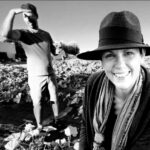During the webinar "A Prototype for Sustainability: Tezcotzingo in Australia," Jo Corrigan shared her remarkable transition from restaurateur to sustainable farmer in Australia. With a career spanning 13 years as a chef in London and a decade running her own restaurant in Melbourne, Corrigan described how personal circumstances, including a breast cancer diagnosis, prompted her to rethink her relationship with the land and food production. Her experience as a restaurateur had shown her the challenges of accessing affordable organic and biodynamic products in Australia, where many crops are grown out of season. This reality, combined with her desire to reconnect with nature, led her to undertake an innovative farming project alongside her partner Matthew. One of the most inspiring aspects of her story is how she accessed land without needing to purchase it. Through a simple letter distributed to 25 mailboxes in her community, explaining her vision of creating a market garden and offering to share the produce, she received 18 positive responses. This strategy not only helped them find land to cultivate but also deeply integrated them into their new community. Corrigan emphasized the importance of maintaining a manageable scale to ensure project sustainability. Starting with a tennis court-sized space, they have gradually grown to cultivate five acres on a local vineyard. Her approach combines the scientific precision learned in the kitchen with careful observation of nature, using simple but effective tools to monitor soil conditions and climate. The chef-turned-farmer advocates for diversification and collaboration among local producers, sharing equipment and knowledge. She highlights the importance of finding unique market niches, such as growing uncommon varieties that appeal to chefs, and the need to maintain a solid business approach to ensure long-term viability. Her most powerful message is aimed at young people interested in farming: land ownership isn't necessary to start. She suggests beginning with simple crops like garlic, which require minimal attention and can be managed alongside regular employment. This gradual approach allows for gaining experience and building a solid foundation for an eventual full transition to farming. Corrigan's experience demonstrates how culinary skills can successfully translate to sustainable agriculture, and how community support can facilitate land access for new farmers committed to local, seasonal production.
